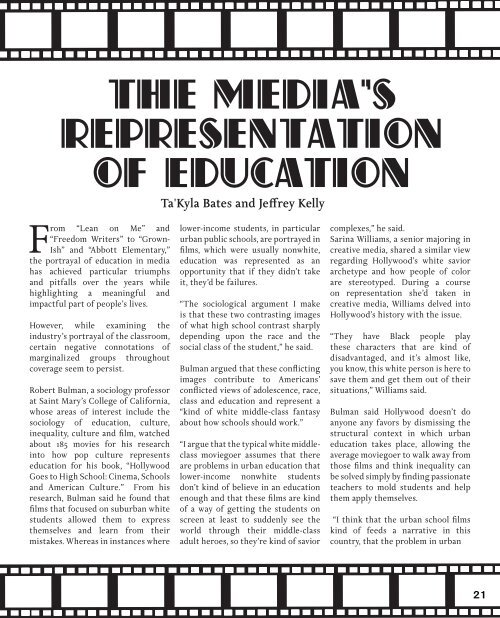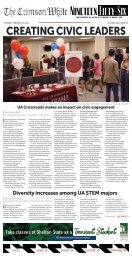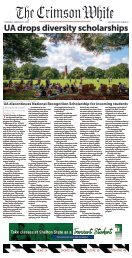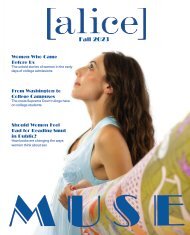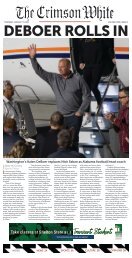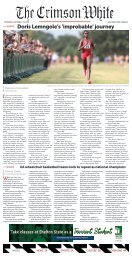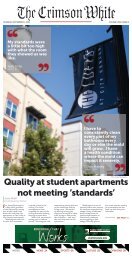Nineteen Fifty-Six Vol. 4 Issue 1
Nelson Mandela once said “Education is the most powerful weapon which you can use to change the world.” With the Fall 2023 Issue of Nineteen Fifty-Six, "Blackology" we wanted to highlight stories of Black Education from past, present and future. Focusing on the beautiful aspects of Black education but also he trials and hardships with it as well. Mostly we wanted to celebrate what it means to Black and Educated in an edition dedicated to Black educators, students and youth.
Nelson Mandela once said “Education is the most powerful weapon which you can use to change the world.” With the Fall 2023 Issue of Nineteen Fifty-Six, "Blackology" we wanted to highlight stories of Black Education from past, present and future. Focusing on the beautiful aspects of Black education but also he trials and hardships with it as well. Mostly we wanted to celebrate what it means to Black and Educated in an edition dedicated to Black educators, students and youth.
You also want an ePaper? Increase the reach of your titles
YUMPU automatically turns print PDFs into web optimized ePapers that Google loves.
The Media's<br />
Representation<br />
of Education<br />
Ta'Kyla Bates and Jeffrey Kelly<br />
From “Lean on Me” and<br />
“Freedom Writers” to “Grown-<br />
Ish” and “Abbott Elementary,”<br />
the portrayal of education in media<br />
has achieved particular triumphs<br />
and pitfalls over the years while<br />
highlighting a meaningful and<br />
impactful part of people’s lives.<br />
However, while examining the<br />
industry’s portrayal of the classroom,<br />
certain negative connotations of<br />
marginalized groups throughout<br />
coverage seem to persist.<br />
Robert Bulman, a sociology professor<br />
at Saint Mary’s College of California,<br />
whose areas of interest include the<br />
sociology of education, culture,<br />
inequality, culture and film, watched<br />
about 185 movies for his research<br />
into how pop culture represents<br />
education for his book, “Hollywood<br />
Goes to High School: Cinema, Schools<br />
and American Culture.” From his<br />
research, Bulman said he found that<br />
films that focused on suburban white<br />
students allowed them to express<br />
themselves and learn from their<br />
mistakes. Whereas in instances where<br />
lower-income students, in particular<br />
urban public schools, are portrayed in<br />
films, which were usually nonwhite,<br />
education was represented as an<br />
opportunity that if they didn’t take<br />
it, they’d be failures.<br />
“The sociological argument I make<br />
is that these two contrasting images<br />
of what high school contrast sharply<br />
depending upon the race and the<br />
social class of the student,” he said.<br />
Bulman argued that these conflicting<br />
images contribute to Americans’<br />
conflicted views of adolescence, race,<br />
class and education and represent a<br />
“kind of white middle-class fantasy<br />
about how schools should work.”<br />
“I argue that the typical white middleclass<br />
moviegoer assumes that there<br />
are problems in urban education that<br />
lower-income nonwhite students<br />
don’t kind of believe in an education<br />
enough and that these films are kind<br />
of a way of getting the students on<br />
screen at least to suddenly see the<br />
world through their middle-class<br />
adult heroes, so they’re kind of savior<br />
complexes,” he said.<br />
Sarina Williams, a senior majoring in<br />
creative media, shared a similar view<br />
regarding Hollywood’s white savior<br />
archetype and how people of color<br />
are stereotyped. During a course<br />
on representation she’d taken in<br />
creative media, Williams delved into<br />
Hollywood’s history with the issue.<br />
“They have Black people play<br />
these characters that are kind of<br />
disadvantaged, and it’s almost like,<br />
you know, this white person is here to<br />
save them and get them out of their<br />
situations,” Williams said.<br />
Bulman said Hollywood doesn’t do<br />
anyone any favors by dismissing the<br />
structural context in which urban<br />
education takes place, allowing the<br />
average moviegoer to walk away from<br />
those films and think inequality can<br />
be solved simply by finding passionate<br />
teachers to mold students and help<br />
them apply themselves.<br />
“I think that the urban school films<br />
kind of feeds a narrative in this<br />
country, that the problem in urban<br />
21


